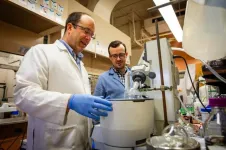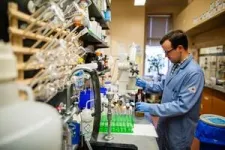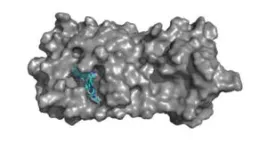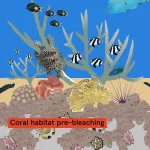(Press-News.org) As the COVID-19 pandemic scattered and isolated people, researchers across Virginia Tech connected for a data-driven collaboration seeking improved drugs to fight the disease and potentially many other illnesses.
A multidisciplinary collaboration spanning several colleges at Virginia Tech resulted in a newly published study, “Data Driven Computational Design and Experimental Validation of Drugs for Accelerated Mitigation of Pandemic-like Scenarios,” in the Journal of Physical Chemistry Letters.
The study focuses on using computer algorithms to generate adaptations to molecules in compounds for existing and potential medications that can improve those molecules’ ability to bind to the main protease, a protein-based enzyme that breaks down complex proteins, in SARS-CoV-2, the virus that causes COVID-19.
This process allows exponentially more molecular adaptations to be considered than traditional trial-and-error methods of testing drugs one by one could allow. Candidate molecule adaptations can be identified among myriad possibilities, then narrowed to a few or one that can be created in a laboratory and tested for effectiveness.
“We present a novel transferable data-driven framework that can be used to accelerate the design of new small molecules and materials, with desired properties, by changing the combination of building blocks as well as decorating them with functional groups,” said Sanket A. Deshmukh, associate professor of chemical engineering in the College of Engineering. A “functional group” is a cluster of atoms that generally retains its characteristic properties, regardless of the other atoms in the molecule.
“Interestingly, the newly designed functionalized drug not only had a better half maximal effective concentration value than its parent drug, but also several of the proposed and used antivirals including Remdesivir,” Deshmukh said, referring to a measure of compound potency.
Moving through all the phases of the study would not have been possible without extensive cross-departmental collaboration.
Four Virginia Tech faculty members – Deshmukh; Anne M. Brown, associate professor with University Libraries and the Department of Biochemistry in the College of Agriculture and Life Sciences; Andrew Lowell, assistant professor in the Department of Chemistry in the College of Science; and James Weger-Lucarelli, assistant professor in the Department of Biomedical Sciences and Pathobiology at the Virginia-Maryland College of Veterinary Medicine — are among 13 co-authors of the published study.
Deshmukh group’s expertise in developing transferable computational models and frameworks for accelerated design of drug-like small molecules and materials, and Brown’s extensive computational expertise in protein structure-function relationships meshed seamlessly as a baseline for the study.
“Sanket’s group had a molecular repurposing framework, and I have experience with exploiting protein targets,” said Brown. “Combined with Andrew who does the synthesis, which is to make the compound, and then James doing the testing and the viral assays, we formed a fantastic collaboration.”
But the faculty members stress that it was the graduate students and postdoctoral students in the laboratories who made the study possible. Nine of them are co-authors: Samrendra K. Singh, chemical engineering, Kelsie King, genetics, bioinformatics, and computational biology; Cole Gannett, chemistry; Christina Chuong, biomedical and veterinary sciences; Soumil Y. Joshi, chemical engineering; Charles Plate, chemical engineering; Parisa Farzeen, chemical engineering; Emily M. Webb, entomology; and Lakshmi Kumar Kunche, chemical engineering.
The professors said the students communicated well with one another without any prompting from their mentors. “I think one of the great things to see is the students really talking with one another and collaborating with one another as well without us having to say ‘Do this,’” Deshmukh said.
Finally, the functionalized molecules were tested against live SARS-CoV-2 in a veterinary college laboratory by Weger-Lucarelli and his team.
“Initial virtual screening of the existing database identified a parent compound that was expected to inhibit the protease of SARS-CoV-2,” Weger-Lucarelli said. “Then the data-driven framework altered the structure of that molecule to enhance that activity. We compared those side by side to show that this new compound that was expected to be more potent against SARS-CoV-2 than the parent compound was, in fact, more potent against SARS-CoV-2.”
The process to develop and test a functionalized molecule against COVID-19 has many potential applications even beyond mitigation of COVID-19. Studies are ongoing among the team to employ the same type of research to find functionalized molecules that may be able to treat hepatitis E, dengue fever and chikungunya, the latter two being mosquito-borne illnesses.
“Another direction we’re going in is that we’re targeting proteases and enzymes from other viruses and trying to design other new molecules,” Lowell said.
The algorithm process also has potential in non-biological uses, Sankit said. The “approach is very versatile and is being applied to functionalize and design other materials such as metal organic frameworks (MOFs), glycomaterials, polymers, etc.,” the paper states.
The assembled interdisciplinary team is planning to continue its collaborations.
“None of us could do this work without the other people in this collaboration,” Weger-Lucarelli said.
“This is a great example of the synergy between going from computational prediction to chemical synthesis to testing in viruses,” Brown said, “and how we at Virginia Tech are really emphasizing that interplay between these three areas and taking that to the next level to develop strong collaborative teams.”
END
Collaborative study focuses on using computer algorithms to find molecular adaptations to improve COVID-19 drugs
2023-10-18
ELSE PRESS RELEASES FROM THIS DATE:
Study predicts potential for 110% electricity increases in U.S. urban buildings
2023-10-18
A research study led by University of Oklahoma assistant professor Chenghao Wang and recently published in the journal Nature Communications tackled the critical issue of how city-scale building energy consumption in urban environments will evolve under the influence of climate change.
Fossil fuels account for approximately 40% of all building energy use in urban city centers in the United States, and the U.S. Energy Information Administration reports that residential and commercial buildings in U.S. cities are one of the major energy ...
Open access: Need to move away from transformative agreements
2023-10-18
Sweden is far ahead when it comes to promoting open access to scholarly publications. But there is risk of getting stuck in a permanent transformation that favours large commercial publishers. A new report from the Association of Swedish Higher Education Institutions develops a strategy on how to work in negotiations with the publishers.
In 2021, the Association of Swedish Higher Education Institutions (Sveriges universitets- och högskoleförbund, SUHF) convened a “Beyond transformative agreements” working group (the BTA group) to lay the foundation for further advancing the transition to open access. Now, the group ...
Graz University of Technology study on e-scooter accidents: more helmets and less speed reduce the injury risk
2023-10-18
The use of e-scooters has increased significantly in recent years, but so has the number of accidents involving this relatively new form of transport. At the same time, knowledge about injury mechanisms in this area was still very limited. In the project SURF, funded by Zukunftsfonds Steiermark, the Vehicle Safety Institute at Graz University of Technology (TU Graz) investigated this topic using Human Body Models and derived recommendations to reduce the injury risk in e-scooter accidents.
Put on a helmet, decrease speed and get off the pavement
As ...
Reef-devouring predator survives coral bleaching and feasts on the survivors
2023-10-18
Research conducted by marine biologists from the University of Sydney has found juvenile crown-of-thorns starfish can withstand tremendous heatwaves well above levels that kill coral. These starfish then develop into carnivorous predators that devour reefs just as they begin to regrow.
Crown-of-thorns starfish are native to the Great Barrier Reef and found in the Indo-Pacific region, but they are classified as a species of concern because the damage large populations cause to coral is more significant than any other species. ...
Does SARS-CoV-2 infection have urological effects?
2023-10-18
Research published in the Journal of Internal Medicine indicates that SARS-CoV-2 infection may worsen lower urinary tract symptoms (LUTS) in men.
The study included 17,986 men receiving medication for LUTS within the public healthcare system of Hong Kong in 2021–2022, half of whom had SARS-CoV-2 infection. The group with SARS-CoV-2 had significantly higher rates of retention of urine (4.55% versus 0.86%); blood in the urine (1.36% versus 0.41%); clinical urinary tract infection (4.31% versus 1.49%); bacteria in the urine (9.02% versus 1.97%); and addition of 5-alpha reductase inhibitors, which are drugs prescribed for enlarged prostate. (0.50% versus 0.02%). These urological ...
How did the initial COVID-19 wave affect mental health in the UK?
2023-10-18
New research published in Economic Inquiry reports substantial increases in psychological distress in the UK during the first wave of the COVID-19 pandemic.
Mental health effects were more pronounced for females; younger individuals; Black, Asian, and minority ethnic communities; and migrants. Also, people who had financial worries, loneliness, or were living in overcrowded dwellings experienced significantly worse mental health deterioration during the first wave.
The study used data from the UKHLS, also known as Understanding Society, which is a household panel dataset that captures, among other things, information from adults about their economic and social circumstances, ...
Heat-tolerant predatory sea stars will likely be a threat to coral during climate change
2023-10-18
Population outbreaks of the crown-of-thorns sea star (COTS), a predator of coral, can cause widespread coral mortality. COTS are herbivorous as juveniles but then switch to coral consumption as they grow to adulthood. When researchers exposed juvenile COTS to heat stress scenarios at time and temperature durations designed to reflect conditions that cause coral bleaching and mortality, juveniles exhibited tolerance to heatwave conditions well above levels that kill coral.
The findings, which are published in Global Change Biology, indicate that juvenile COTS are likely to persist as major coral predators in reefs already vulnerable to the effects of climate change.
“This ...
Does COVID-19 affect Alzheimer’s disease risk?
2023-10-18
The various neurological symptoms that patients with COVID-19 have experienced suggest that viral infections may increase the risk of neurodegeneration, which could in turn contribute to the development of conditions such as Alzheimer’s disease (AD). A review in the Journal of Neurochemistry highlights the potential mechanistic links between COVID-19 and AD.
The authors note that age is the largest contributing factor to AD and COVID-19, and both appear to enhance the effects of the other, with potentially synergistic effects on neurodegeneration.
“I believe over the next several ...
Can planting multiple crops in the same plot improve agricultural production and sustainability?
2023-10-18
Agricultural management has typically focused on increasing yields, but there is an increasing need for sustainable food production that limits negative impacts on the environment. A new study published in Grassland Research provides insights into the potential benefits of diversifying agricultural practices, revealing how different mixtures of plant species can improve production, quality, and conservation.
For the study, investigators planted multiple species in different grassland plots, manipulating plant species richness from one to six species spanning three functional groups ...
New method may accurately identify body fluids at crime scenes
2023-10-18
Identifying different types of body fluids can help forensic experts reconstruct a crime scene, but it’s difficult to do so. In a study published in Electrophoresis, researchers developed a method using two different types of RNA—called microRNA (miRNA) and messenger RNA (mRNA)—to determine five common body fluids.
Compared with previously reported single mRNA or miRNA assays, the combination of several mRNAs and miRNAs showed significant advantages for labeling human body fluids.
“Our findings indicate that this combined mRNA and miRNA system may provide a scientific ...






